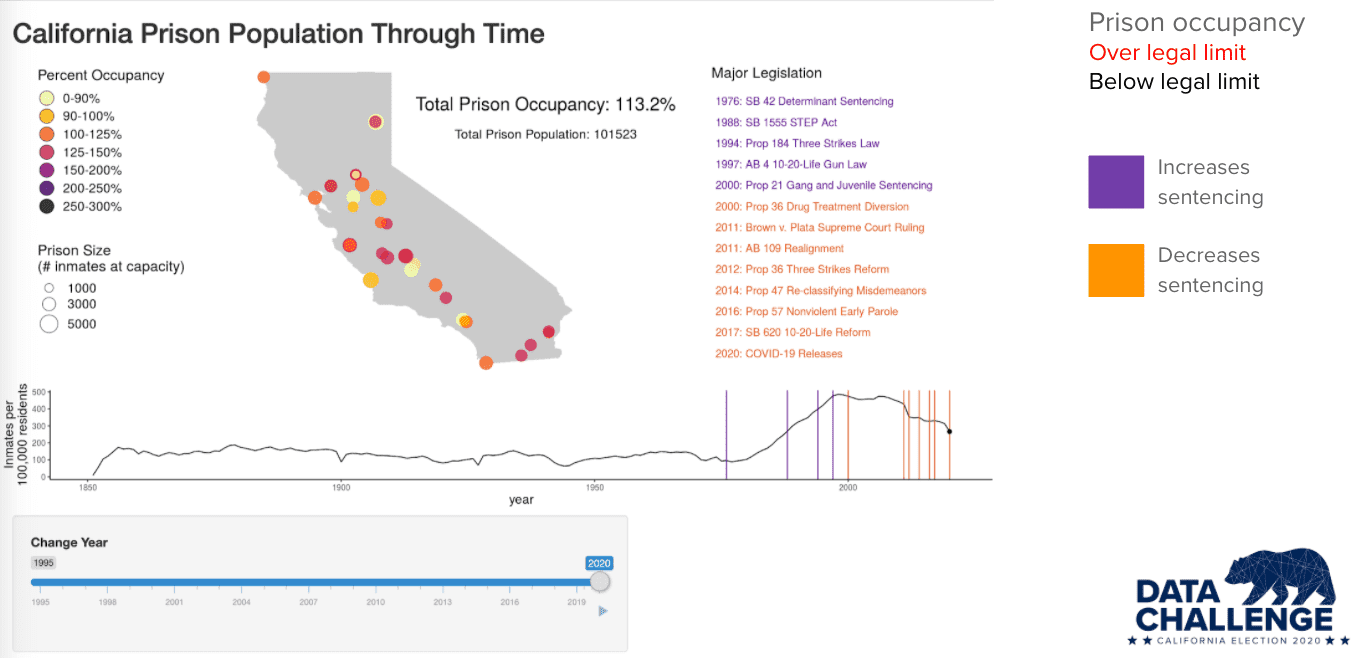One of the winning projects in the California Election 2020 Data Challenge used data visualization and mapping to explore how restoring parolees’ voting rights (Proposition 17) might influence local elections. These maps show (at left) the estimated number of parolees living in each county in 2018, and (at right) the rate of parolees per 100,000 eligible voters by county.
Students’ Data Science Projects Explore California Ballot Initiatives
Could restoring voting rights for parolees (Proposition 17) potentially affect the outcome of local elections? How does Proposition 20 fit in context of the historical relationship between California legislation and overcrowding in prisons? Who is supporting and funding the “yes” and “no” campaigns for Proposition 22 — the most expensive proposition in California history — which will determine whether app-based rideshare and delivery drivers receive certain employee benefits?
UC Davis students used data science and visualization to shed light on these questions and more related to this year’s ballot initiatives through the California Election 2020 Data Challenge. During a public webinar this Wednesday, October 21 at at 5:00 p.m. (register at bit.ly/CAdatachallenge), the winning teams will share what they learned:
• Postdoctoral scholar Erica Orcutt Ph.D. ’19 and alumni Laura Daly M.A. ’17 and Sarah Byer M.A. ’17 found that in counties with high numbers of parolees, such as Fresno and San Bernardino, local school board elections and city council races are the two types of election contests that could be most influenced overall by the passage of Proposition 17.
• Examining the historical relationship between California legislation and overcrowding in prisons, doctoral candidates Erin Calfee, Katherine Corn and Darien Sutterfield asked if prison overcrowding will remain under the U.S. Supreme Court’s mandated 137.5% capacity ruling and there will be enough space for prisoners if Proposition 20 passes.
• In an analysis of Proposition 22 campaign financing, sister-and-brother team Trisha Ramadoss, a first-year Ph.D. student at UC Davis and Nitin Ramadoss, a sophomore at the University of Florida, compared the number of funders and the amount of money raised over time by the campaigns supporting and opposing the classification of app-based drivers as “independent contractors” rather than “employees.”
Also speaking at the online event will be Jesse Salinas, Yolo County’s chief election officer, who will address the importance of new technology and data-driven strategies in running elections, and Mindy Romero, UC Davis alumna and founder and director of the Sacramento-based Center for Inclusive Democracy, part of the USC Sol Price School of Public Policy, who will speak on the power of data in policy reform. UC Davis University Librarian and Vice Provost for Digital Scholarship MacKenzie Smith will address the importance of preparing students for the workforce by teaching data literacy skills.

Hands-on learning despite the pandemic
Many college campuses have wrestled with how to continue providing hands-on learning opportunities for students during the COVID era. The California Election 2020 Data Challenge showed how it can be done.
During the monthlong challenge, participants received mentoring over Zoom and Slack from UC Davis data science, research and policy experts who helped them shape relevant research questions and analyze publicly available datasets using data visualization.
Leveraging the expertise of its co-sponsors — the UC Davis DataLab, a campus hub for research support and training in applied data science and informatics based at the UC Davis Library, and the policy-oriented Scholars Strategy Network — the challenge both engaged students in the civic process and gave them an opportunity to develop data literacy skills that are in-demand for workers in many fields today.
“Because so much of what we do is about teaching students to use data science and digital technology, the DataLab was well positioned to pivot to the virtual environment when COVID hit,” said Carl Stahmer, executive director of the DataLab. “The California Election 2020 Data Challenge is a great example of how the pandemic has pushed us to innovate further and faster in developing new ways for students, researchers and data scientists to collaborate and learn online.”
With cash prizes as an added incentive, the competition ultimately engaged more than 100 participants, largely graduate and undergraduate students, and 20 teams successfully completed projects. Eight ballot propositions were explored by teams in the competition; in addition to those noted above, teams examined issues related to Prop 15 (tax reform), Prop 16 (affirmative action), Prop 18 (voting rights for 17 year olds), Prop 21 (rent control) and Prop 23 (requirements for dialysis clinics).
“While I know this wasn’t an explicit goal of the challenge, the data presented by the teams even helped me decide how to vote on one of the propositions,” said Vessela Ensberg, the library’s associate director of data architecture and one of the challenge mentors.